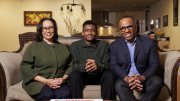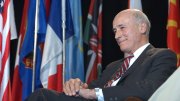The Harvard Gazette reports that President Drew Faust joined a Harvard Business School (HBS) class for a personal discussion of Martin Luther King Jr.’s “Letter from Birmingham Jail,” the civil-rights leader’s resonant defense of civil disobedience. Her participation underscores the emphasis she has placed on public service. But it also continues a series of statements Faust has made this year on the persistent divisions caused by race in American society, and indeed around the world—a theme that arose early and vividly in her life as she grew up in the segregated South during the era of Brown v. Board of Education. Faust portrayed that time, as well as her growing awareness of racial division and her rejection of segregation, in “Living History,” published in Harvard Magazine in 2003, when she was dean of the Radcliffe Institute.
The King text is used each year in HBS’s required first-year course, “Leadership and Corporate Accountability” (a full report on which appeared in the September-October 2006 Harvard Magazine). In her class presentation, the Gazette reports, Faust said, “I spent my whole life following Martin Luther King, feeling somehow accountable for the issues he raised. The resonance of the movement for us was even more powerful than for those who lived elsewhere. It also offered us a very clear way in which we could make a difference.”
During remarks at the Black Alumni Weekend last September, Faust spoke of “the remarkable paths to achievement of W.E.B. DuBois [A.B. 1890, Ph.D. 1895] and Barack Obama [J.D. ’91]” and of the reminders of “just how imperfect our union still is.” She summoned the memory of historian John Hope Franklin [Ph.D. '41, LL.D. ’81], who spoke at her installation ceremony, and of his uneasy experiences at Harvard, and said that in her annual addresses to entering freshmen in the Black Students Association, she reminded her audiences that “for much of its past, Harvard did not belong to all of us. I tell them that in the first 233 years of Harvard’s existence, there were no black alumni and few Catholics or Jews. And, I hardly need say, no women for even longer.”
How had the University progressed? she asked. In part, she answered, through harnessing the intellectual power of the faculty and alumni in shaping “the national and international conversation about justice and equality.” Concluding a historical summary of change, she ended on a personal note, recounting the results of the recent presidential election: “I grew up in a segregated Virginia in the home county of Senator Robert Byrd,” who led the movement to close public schools rather than comply with integration orders. “I grew up in a Virginia where a combination of the poll tax and patterns of intimidation meant that few blacks even voted. I cannot fully describe to you the feeling I had last fall when I saw on the map the state of Virginia go ‘blue.’”
Two months later, at the emotional high point of a visit to South Africa, Faust spoke at the University of Johannesburg at Soweto. She spoke about arriving at a “new perspective on a nation I care deeply about—a nation colonized by the Dutch and the British, a nation once mired in injustice, a nation whose independence and freedom have inspired the world; a nation of complex racial and ethnic heritage.…it’s a nation whose people could once only imagine the day that their president might have an indigenous African heritage, and for whom that day came.
“I refer, of course, to both our nations,” she continued. She then spoke of the fundamental role of education in opening both societies to their better natures, and of creating opportunities for their oppressed peoples.
The daily responsibilities of the Harvard president—reviewing faculty appointments, setting budgets, appointing deans and consulting with them on their schools’ and the University’s aims—are nearly all-consuming. But each incumbent has managed to develop and to emphasize certain themes about which he or she cares deeply and continuously: think of Derek Bok’s interest in public and government service and the Kennedy School; Neil Rudenstine’s devotion to interdisciplinary research, and to renovating the art museums and libraries; Lawrence Summers’s emphasis on accelerating investment in the sciences and international research and learning.
Drew Faust has staked out some emerging themes: expanding the University’s involvement in all dimensions of the arts, intellectual collaboration across schools and departments, and public service, to name a few. But it is clear that underneath all these commitments, and her scholarly devotion to understanding the pre-Civil War South, Faust’s lifelong immersion in the hard work of overcoming racial division, and other barriers to human advancement, runs very deep.








